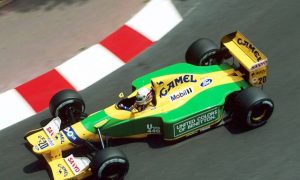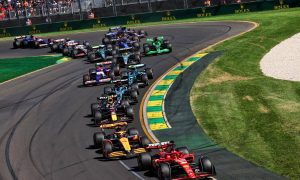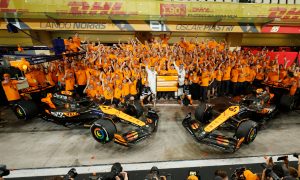We caught up with Derek Warwick at the Bahrain Grand Prix where he was wearing an FIA shirt in his role as a Race Steward. The Hampshire-born, Jersey resident never won a Formula 1 race but his career is still a brilliant one, encompassing many disciplines. There were four podiums from 11 years in Formula 1 and he was World Sports Car Champion in 1992. Maybe that’s why he found it impossible to pick one single race when asked which one he’d rate as the race of his life and his first choice reflects the unusual route Derek took on his way to becoming a Grand Prix driver.
“I think I have to go for more than one,” Warwick says. “Something that really got me going as a driver was when I won the World Championship on the short ovals at Wimbledon stadium in Formula 2 Superstox in ‘73. It was something that you dreamt of as young kid, to be world champion, racing against your father and uncle. People will laugh about this but it was a massive thing to be world champion in Formula 2 Stock Cars and doing it at such a young age.”
Warwick was still in his teens at the time, having won the English Superstox title in 1971.
“At a time when motor racing was regarded as rather posh, Superstox at Wimbledon was the very antithesis of the tweed jacket and flat cap brigade that you’d find at Silverstone.” (To digress very quickly, Martin Brundle also came to F1 from the wrong side of the tracks, or maybe the wrong type of track, as he began racing thrashing around Hotrod arenas).
“Le Mans was special for me,” continues Warwick. “Winning at Le Mans with the Peugeot team run by Jean Todt and taking the sports car title. That was back in 1992, it was just after my little brother was killed It was nice to sort of pin something on his chest. That meant a lot to me.”
Paul Warwick was killed in a Formula 3000 race at Oulton Park in ’91. He was awarded the race win posthumously as well as that year’s British F3000 title. After the tragedy, it was assumed that Derek would retire from the sport, but the man himself saw things differently.
“It’s a strange thing, although Paul was, 13, 14 years younger than me, he was the apple of my eye,” recalls Derek. “He was somebody that would carry on after I stopped racing. He was going to be the great world champion that I wasn’t. When he died, it cut a big hole in our family. Mother never got over it. But I think because I was around in the tough times in Formula 1 when a lot of people were being killed, I think you developed an ability to cut things out.
“Right from the early days, I built a safe in my brain for when people were injured or killed. I was the first there when Gilles Villeneuve was killed in Zolder. I was there when Patrick Depailler was killed at Hockenheim. I’m really a softie. How I can be so hard on the other side, I don’t know. But I had this ability and I used to unlock the safe, (Derek indicates the side of his head at this point) put them in, lock it up. I would not see them for the rest of the weekend until Sunday night. Then the Sunday night, all the emotion would flow out. So when Paul died, I didn’t know whether I’d race or not.
“I remember Tom (Walkinshaw, boss of the Jaguar sports car team) ran a secret test at the A1 Ring in Austria with Jaguar and I drove the car the first day, was reasonably quick, even though there was a lot of emotion, a lot of crying. Then we had a big accident at the end of the first day when a rear shocker broke and I spun at the Bosch curve, into the gravel trap, went back to the hotel and I cried all night. I cried because I was racing, I felt that it was wrong. I cried because I missed my little brother. I cried because of my mum, my dad and how much I was still hurting. And then about three, four o’clock in the morning, I remember being in front of the mirror and I said, “Right, mate. You’ve got to make a choice here.” And the choice was I developed this safe and I put Paul in this safe and I went out the next day, broke the lap record and was the quickest and went on and won races. I’ve always had that ability. But Paul’s death left a big hole in the family.”
Finally, almost as an afterthought, Warwick chooses a Formula 1 race.
“Obviously the first race with Renault in Brazil.”
After a less than brilliant first three years with the newly formed Toleman squad, the Englishman replaced Alain Prost at Renault in 1984. For his maiden outing with the French team, Derek qualified third and looked to be heading for a sensational win until he had to retire in the closing stages.
“I led until two or three laps from the end. I’ve always said this and people might find this difficult to understand - winning’s easy. In the right car, winning is easy. I was always in the right car in the sports cars with Jaguar 86-91, Peugeot 92 and it was easy. You just had to be a professional and the results came. So with Renault in ‘84 in Brazil, that was kind of special because it made me feel that I could compete with anybody. Obviously, it didn’t work out as well as we’d all wanted it to but that’s what it made me feel...”
It’s always nice to talk to Derek Warwick, as he’s got plenty of great tales to tell and never pulls any punches. But a few weeks ago in Bahrain it was a particular pleasure, because for a few months, it seemed that he might not be with us much longer, having been diagnosed with bowel cancer. It’s not normally a topic people want to discuss, but on the contrary, Warwick was keen to make people aware of the disease and what can be done about it.
“In March last year I’d never been fitter when I went for a routine colonoscopy. I had no symptons, no pain. But everyone in the room went silent when they found a tumour and a sample was taken for a biopsy. A few days later, the doctor rang and asked if I was sitting down: I lied because I was actually going quite quickly down the dual carriageway on the way to Silverstone. (Derek is President of the British Racing Drivers Club, which owns the circuit).
“I’m afraid to say you’ve got cancer,” he said. “I didn't understand what that meant. I didn’t know if it meant that I was going to die tomorrow or whether I was going to have a full and active life. I got to Silverstone for a board meeting and sat outside and I just cried and cried. A lot of people keep it inside and don’t want to burden people, but I did it the other way and told the whole world. And then I drew on their strength to give me strength.
“I had a six-hour operation to remove 15 inches of my bowel. The cancer had spread to my lymph nodes, so I then underwent six months of chemotherapy. Although it hit me quite hard, I never missed one day of work. I had decided in my mind that the day I heard I had cancer I would beat it. Literally last Tuesday I got the all-clear. Now I’m telling everyone about it because men are rubbish at talking about ailments, but I don’t think its something to be embarrassed about and getting the word out there. After a certain age we should all be tested before it becomes life threatening. Catching it early is what saved my life.”
Christian Horner - Race of my life
Mercedes: A morning with the champions
Keep up to date with all the F1 news via Facebook and Twitter










